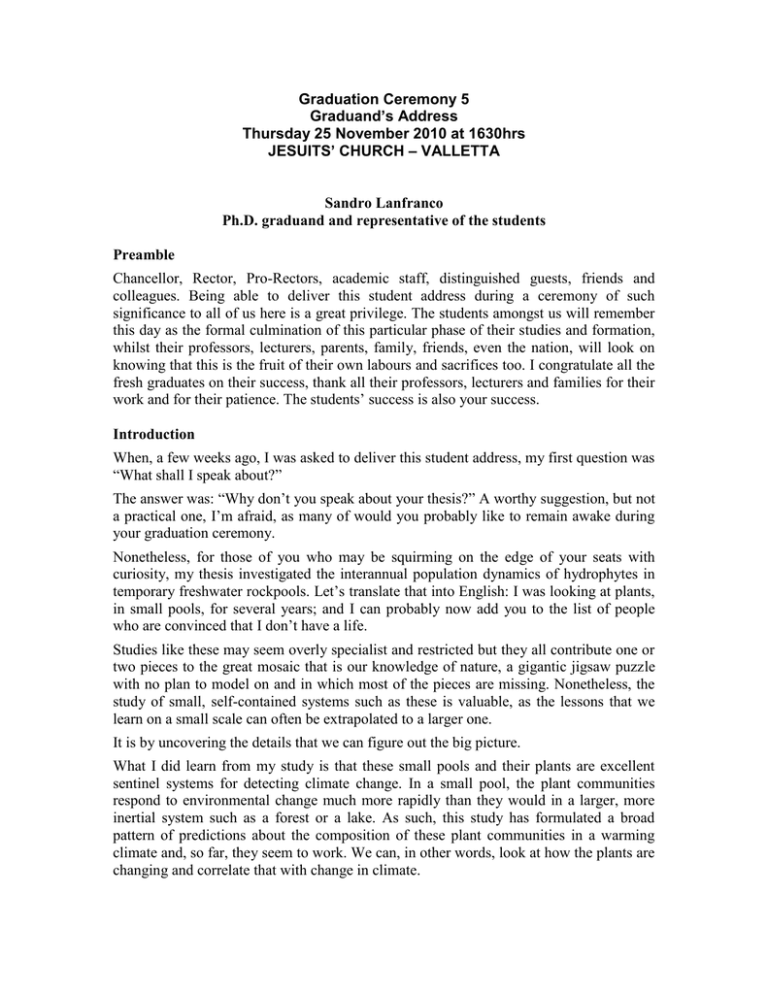Graduation Ceremony 5 Graduand’s Address Thursday 25 November 2010 at 1630hrs
advertisement

Graduation Ceremony 5 Graduand’s Address Thursday 25 November 2010 at 1630hrs JESUITS’ CHURCH – VALLETTA Sandro Lanfranco Ph.D. graduand and representative of the students Preamble Chancellor, Rector, Pro-Rectors, academic staff, distinguished guests, friends and colleagues. Being able to deliver this student address during a ceremony of such significance to all of us here is a great privilege. The students amongst us will remember this day as the formal culmination of this particular phase of their studies and formation, whilst their professors, lecturers, parents, family, friends, even the nation, will look on knowing that this is the fruit of their own labours and sacrifices too. I congratulate all the fresh graduates on their success, thank all their professors, lecturers and families for their work and for their patience. The students‟ success is also your success. Introduction When, a few weeks ago, I was asked to deliver this student address, my first question was “What shall I speak about?” The answer was: “Why don‟t you speak about your thesis?” A worthy suggestion, but not a practical one, I‟m afraid, as many of would you probably like to remain awake during your graduation ceremony. Nonetheless, for those of you who may be squirming on the edge of your seats with curiosity, my thesis investigated the interannual population dynamics of hydrophytes in temporary freshwater rockpools. Let‟s translate that into English: I was looking at plants, in small pools, for several years; and I can probably now add you to the list of people who are convinced that I don‟t have a life. Studies like these may seem overly specialist and restricted but they all contribute one or two pieces to the great mosaic that is our knowledge of nature, a gigantic jigsaw puzzle with no plan to model on and in which most of the pieces are missing. Nonetheless, the study of small, self-contained systems such as these is valuable, as the lessons that we learn on a small scale can often be extrapolated to a larger one. It is by uncovering the details that we can figure out the big picture. What I did learn from my study is that these small pools and their plants are excellent sentinel systems for detecting climate change. In a small pool, the plant communities respond to environmental change much more rapidly than they would in a larger, more inertial system such as a forest or a lake. As such, this study has formulated a broad pattern of predictions about the composition of these plant communities in a warming climate and, so far, they seem to work. We can, in other words, look at how the plants are changing and correlate that with change in climate. Climate change Why was the study concerned with climate change? Climate change, by which we usually imply global warming, is, as we all know, one of the fashionable buzz-words of the moment. It has entered the public imagination and the vocabulary of the policy-maker. Each generation has its own apocalypse and this is ours. As scientists, we can point out that climate change is actually the norm. Climate is never static, never unchanging, never immutable. Conditions have changed before and will change again. The Cretaceous Period, 65 million years ago, was much warmer than the present and, more recently, much of the Quaternary was colder. That is little consolation. Rather belatedly, we have realized that our own existence is accelerating the natural cycles of climate change. Power generation, intensive agriculture and haphazard waste disposal have all pumped huge volumes of greenhouse gases into our atmosphere. Reversing this trend will be painful and will be difficult. For a while we did nothing, as though by ignoring it, the problem would go away. Now we seem to have woken up and taken notice but the best we seem to come up with are token gestures that are better for the soul than they are for the environment. They tend to be mostly insignificant and probably make matters worse because it gives us an illusion that we are doing something, that we have done „our bit‟ for climate. Measures that are effective would entail much more sacrifice. They should be global, not local; greenhouse gases do not remain hovering above the country that produced them but disperse across continents. We all seem to agree that we should tackle climate change but few of us seem ready to make the lifestyle changes that are required. This is something that will eventually be forced upon us if we do not act soon. We may not be able to stop global warming but we can slow it down; we can buy time for ourselves to adapt to the new circumstances. As the climate warms and as our soils become saltier, our sea-levels higher, our weather more unpredictable, then the food and water supplies that we have relied on for millennia start changing too. As conditions change, so too must our habits. Role of the scientist Where does the scientist come in? It is up to scientists to provide policy-makers with the tools and principles to address the issue and to preserve our environment, our global environment, in a habitable state. It is ultimately up to scientists to convince an often mistrustful public that this issue is real. No easy task. A skeptical public is usually so because it is in denial. Accepting the existence of a problem means that we now need to look for solutions, and since the solutions on the horizon generally involve higher taxation and changes in lifestyle then it may be simpler to wait for it to go away. The public will also point to discord amongst scientists. If scientists cannot agree amongst themselves on a course of action, then there is nothing certain about all this. We may be sacrificing our luxuries for somebody‟s mathematical model; for a problem that isn‟t. A skeptical public may ask for definite proof before committing its resources to addressing the issue. But you cannot prove anything in science, you can only disprove and we certainly cannot disprove global warming. What is being discussed now about climate change resembles what was discussed in the past about evolution and more recently about the Big Bang. All theories and little more, according to some. The difference is that climate change carries a colossal economic, social and ecological cost. Whether or not you subscribe to the ideas of biological evolution or the Big Bang will not really affect our global future, our potential survival, but climate is different. If we take no action and we‟re wrong about this then many amongst us will have to foot the bill and pay the price. Who shall people listen to therefore? The well-intentioned environmental crusader sometimes reasons with the heart, rather than the head whilst the oil tycoons and their satellites speak for the economy and for their own pocket. Policy-makers all over the world strive to keep their subjects happy and given that the implicit aim of the ruler is to keep on ruling, then policies that are popular or mild rather than brutally effective are often the ones to be implemented. In all of this the warning message of the scientist may be diluted and go unheeded. Scientists cannot abdicate their responsibility to those with the loudest voices. Lessons from the recent past The past is often the key to the present and we can learn from this as we‟ve already been through this with Lead. Lead is a neurotoxin, with the potential to damage the brain and the central nervous system. All of us have much higher levels of lead in our body than our forebears did a century ago and that‟s largely down to the inclusion of lead in petrol. It was a geologist named Clair Patterson who noticed that. He was trying to measure the age of the Earth through radiometric dating and his samples of rock kept on getting contaminated by lead. He eventually traced the contamination to the atmosphere and, from there, to fuel in cars. He discovered that there was almost no lead in the atmosphere before 1923, when lead was first used as an additive, but post-1923 levels skyrocketed. He devoted much of the rest of his career to getting lead taken out of petrol. Lead was in our bodies yet various flawed studies claimed there was no threat. Selling fuel is big business and no one wants science to get in the way of profit; Patterson was repeatedly ignored and discriminated against. We now know that he was right and it is thanks to Clair Patterson that we now use unleaded fuel routinely. But Patterson sacrificed his career for that and is one of the greatest scientists that most of us have never heard of. That may well be a lesson for us all; but with global warming the effects are likely to endure longer than a few human lifetimes. The role of the University What is the role of universities in all of this? Institutions such as ours have been producing graduates in science and technology for many years. Some are at the cutting edge of theoretical research whilst others are applying research in their day-to-day routine. Science and technology evolve so rapidly that our scientists, our technologists, are often catapulted straight into the Red Queen‟s Race: "It takes all the running you can do, to keep in the same place". Yet in the face of all this, it is these scientists that, in one way or another, directly or indirectly, will address the problem and perhaps propose solutions. It is from Universities, including our University, that these scientists will emerge. On this day, the ranks of scientists and technologists in our islands have swelled. Some of you will be saving lives others will be improving them. All will be valuable. Concluding note Will this be enough? You cannot please everyone all of the time. If you take one road, some will ask why you didn‟t take another. The multiplicity of opinions may confound. A course of action may still seem like inaction to some. I‟m aware that platforms such as this have, in the past, been used to complain about our University, to gripe and to moan. It has become something of a tradition, for some perhaps, a sport, to take shots at our institution during such ceremonies. The temptation must be overwhelming when one has a captive audience to entertain. I take the opposite view. There are shortcomings in our institution. Nothing is perfect but nothing will ever be perfect, particularly since the definition of perfection is a very individual and very subjective one. Let‟s look at matters in perspective however. We live on a little rock, 10 miles by twenty and which has its own university. A university that consistently punches well above its own weight in terms of achievement and aspiration. A university that has achieved this status thanks to its human resources and its ingenuity. Rather than complain about what we lack, let us utilize what we do have, to the full. Thank you.




